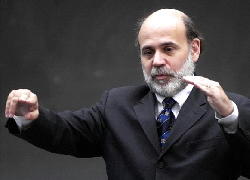One for the Money

Dubya's latest appointment is a cause for some relief, given the Harriet Miers debacle. The President announced today that he is appointing Benjamen Bernanke to be Alan Greenspan's replacement as Chairman of the Federal Reserve Board -- head of the organization that effectively controls the money supply and the most powerful person in the nation next to the President and the High Priests of the Star Cha....er...the Justices of the Supreme Court.
Fed chairmen can do some good, but much more easily can do a great deal of harm. Both Greenspan and his predecessor, Paul Volker, were staunch monetarists, at least in practice, and devoted themselves to a stably and slowly growing money supply. We have lived under stable monetarism insulated from political interference for so long that we have forgotten what unstable, politically influenced tampering with the money supply was like under Jimmah Cawtuh and his Man With The Briefcase Fulla Moola, G. William Miller. Let see...."stagflation" is what they called it, as I recall: 12%+ inflation and < 2% economic growth. The Democrats were best at this, of course, but the Republicans tried their hand at it too. Ford and Nixon tampered with the money supply when it was politically convenient, Nixon most famously with his repeal of Bretton-Woods. To his credit, Carter did appoint money hawk Volker to the Fed in the summer of '79 (ahh...I remember it well...), but it took a Republican of conviction -- Reagan, naturally -- to listen to the likes of Milton Friedman and give us a truly stable money supply. We've kept it that way ever since and even Clinton, to his infinite credit, didn't mess with a good thing ("it's the economy, stupid...")
Barnenke seems to be cut from the Volker / Greenspan mold, even if he is not quite as hawkish on the money supply as Greenspan. I like his writings concerning information flow in the economy -- they parallel some of my own thinking concerning the role of the velocity of information in conflicts.
Here are some particulars about the man. Five facts from al-Reuters:
-- Bernanke was Fed board governor from August 2002 until June 2005, after serving as chairman of Princeton University economics department and as a member of the National Bureau of Economic Research panel that determines recessions.
-- He has long advocated the Fed adopt a publicly stated inflation target, a step Greenspan has steadfastly opposed.
-- At the Fed, he argued policy-makers could improve the effectiveness of interest-rate policy by offering more information on their economic and policy views. "If monetary policy is like driving a car, then the car is one that has an unreliable speedometer, a foggy windshield and a tendency to respond unpredictably," he said in December.
-- He grew up in Dillon, South Carolina and is married with two children. In high school, Bernanke reportedly taught himself calculus because his school did not offer the subject. He was a summa cum laude economics graduate from Harvard and has a doctorate in economics from the Massachusetts Institute of Technology.
-- Bernanke served on the board of the Montgomery Township School District in New Jersey from 1994-2000. "Six grueling years during which my fellow board members and I were trashed alternately by angry parents and angry taxpayers," he said of his experience.
His reputation seems pretty solid among all economic conservatives except the X-Stream supply-sider fringe. In that crowd, there is some dissent. Take John Tamny at NRO (please):
About taxes, Bernanke spoke of “fiscal stimulus” that has diminished “in the past few quarters.” Bernanke is clearly in the Keynesian camp on taxes, holding that they should be reduced during times of slack demand and increased when economic growth reaches its natural “limits.” While Keynesians see tax cuts through a demand-driven, short-term stimulus prism in which their impact gradually recedes, supply-siders encourage marginal rate cuts for their long-term (and continuous) incentive effects on economic activity.
Bernanke wrote about employment, and his belief that there is a “highest level of employment that can be sustained without creating inflationary pressure.”
Leaving aside the ability of markets to innovate constantly around labor shortages, not to mention the static assumptions that would lead one to believe in “full” employment and “limits” to economic growth in the first place, the real concern here is that someone who could potentially oversee our monetary policy essentially sees the U.S. economy as closed beyond the importing/exporting function.
Wow. Accusing someone of being Keynesian and a believer in "limits to growth" in conservative economic circles is like comparing someone to both Hitler and Stalin in a political debate. Them's fightin' words!
I see things differently. Bernanke wasn't invoking "limits to growth" or a closed system, zero-sum economy, a la the Club of Rome or the anti-World Bank fruitbats; he was simply stating a truth evident to all but the most fervent, frothing supply-siders: that there is some pace of general growth beyond which unacceptable monetary inflation begins. Similarly, saying that there are demand pressures within the economy does not make Bernenke a John May-nerd. If there's anything negative to say about his econo-philosophy, it's that he has a bit of econometrician stink about him, but that makes him a micro-, not a macro-economist. In fact, I think you can literally say "he wrote the book on it."
I also have no trouble with Bernanke's idea of inflationary targets, even though I am more a "value of money" (Austrian) than a "quantity of money" (Friedmanesque) type of guy. Besides, Paul Krugman--Mister Neo-Keynes himself--has adamantly opposed Bernanke's policies as a Fed governor and on the Council of Economic Advisors, so Ben can't be all bad.
In any event, he looks like a good choice from all I've seen...and that makes me a little more comfortable if we wind up stuck with Dubya's pick for the SCOTUS. We shall see if events bear me out.
Monk



